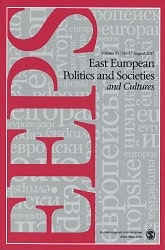Introduction: The State of Democracy 20 Years on: Domestic and External Factors
Introduction: The State of Democracy 20 Years on: Domestic and External Factors
Author(s): Jan ZielonkaSubject(s): Political history, Government/Political systems, Transformation Period (1990 - 2010), EU-Accession / EU-DEvelopment
Published by: SAGE Publications Ltd
Keywords: democracy; East Europe; European Union; populism; authoritarian regimes;
Summary/Abstract: The countries of East-Central Europe (ECE) embarked on a democratic transition in 1989 were proclaimed consolidated democracies when they joined the European Union (EU) in 2004. Today most of the new democracies are experiencing “democratic fatigue” and some seem vulnerable to an authoritarian turn. The EU, seen as the guarantor of the post-1989 democratic changes, is experiencing an unprecedented economic, financial, and democratic crisis with the combined challenges of technocracy and populism. The article explores the different approaches to the study of democracies in ECE, their specific features and vulnerabilities, and tries to provide an interpretation of the premature crisis of democracy in ECE in a broader transeuropean context.
Journal: East European Politics and Societies
- Issue Year: 27/2013
- Issue No: 01
- Page Range: 3-25
- Page Count: 23
- Language: English
- Content File-PDF

